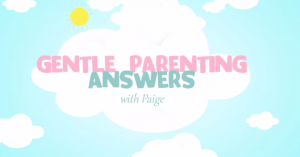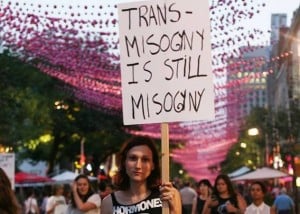
Source: Wired
You probably don’t need me to tell you that the words you say have meaning.
When we interact with others, our words act as conduits for our thoughts and feelings. And this impacts every relationship that we have and every conversation that we participate in.
It also makes navigating our language incredibly complicated.
So it should come as no surprise that the words we use as activists matter, too.
The way that we describe our movements, allies, and opponents is loaded with meaning, and it is our responsibility as feminists to be mindful of the ways in which we wield this power.
The words we choose to use can validate or erase people and identities. They can be laden with history, connotation, and emotional significance. Most importantly, they always contain powerful messages.
So how can we best use our words in order to make change?
1. Be Inclusive of All Gender Identities
Learning to speak inclusively means ensuring that the words we use include all those whose identities apply to a given situation. And speaking in this manner is applicable to both your personal and professional lives.
Assuming the gender of someone that you meet, or the gender of those in the room, runs the risk of erasing identities.
Often, addressing this means using gender-neutral language in order to include all who are trying to access the information we are offering.
Speaking gender-neutrally also means keeping in mind that most of the issues that we are working for can’t be pigeon-holed as “men’s issues” or “women’s issues.”
One place we often run into this problem is in conversations around reproductive rights.
It is easy to fall into the pattern of calling abortion a women’s issue, but this erases the identities of trans* and non-binary folks.
In reality, safe and reliable access to abortion is important for everybody who needs it. Framing it as a women’s issue erases the stories of those who have and need abortions who are not women.
Learning to speak this way can be as simple as substituting “they” for a gendered pronoun or “people” in the place of “men” or “women.”
Permanently making this switch is little harder, and it will take time. However, including everybody is worth the time and effort.
It will make you a better ally and expand the reach of your messages.
2. Keep Your Privilege in Mind
Being inclusive doesn’t just mean respecting and including gender identity.
It also means recognizing how other aspects of one’s identity, such as race, class, and gender, impact both the way we speak and the impact of our message on others.
A lot of the terms that we use as feminists have incredibly loaded histories.
For example, words like “queer,” “slut,” and “bitch” have historically been used as slurs, but many have now reclaimed them. They may have taken on new meaning for some, but the reality is that our relationships with these terms are still much more complicated.
Consider how they impact others, both now and historically.
Just because you’ve reclaimed a word does not mean that others have, that its history is suddenly erased, or that some may not still be triggered by it.
Recognize that reclaiming these words can come from a place of privilege, and do your best to navigate conversations about them accordingly.
This often means doing some independent research so you know what you’re talking about.
It could be as big as taking on a research project or as small as following some blogs or social media accounts on the topics you want to know more about. Eventually, you will be more looped into which words are problematic and why.
It is a learning process, but it is one that is absolutely essential to each of our journeys as feminists.
3. Understand Your Intentions
Understanding what you are trying to say is perhaps the most important step to really being conscious of the words you put out into the world.
When you aren’t sure of what you’re saying or even what you want to say, it is easy to misspeak and lose details along the way.
As an activist, it is important that you know what message you are trying to convey, or else what are you fighting for?
Put power in your voice by putting intention behind your word choice.
Think about what you really want to say and how best to say it. When you do, you’ll probably find that the words you choose paint a much better picture of your message and the world you envision.
For example, take the terms “anti-choice” and “pro-life.”
Each comes with its set of specific connotations. “Anti-choice” implies being against granting choice, while “pro-life” implies advocating for life.
When we use “pro-life” instead of “anti-choice,” we are putting power behind a narrative that anti-choicers want the world to see instead of the one we know to be true.
Intentionally choosing to use an anti-choice frame when describing this group is more in tune with the message we are often trying to send.
Another great example of the power of intentional word choice is using “partner” instead of “girlfriend” or “boyfriend.”
What does using each of these terms say about your relationship, your significant other(s), and our cultural values and norms?
Choosing which term to use in a given situation can have a big impact on your message, so ask yourself what you are trying to communicate and how best to do that.
How can you frame your message in order to best convey whatever it is that you’re trying to get across?
Positioning ourselves, our opponents, and our movements with intention can help get our message across and make it stick.
4. Listen To and Accept Criticism
Even if you’ve done your research, you won’t always get it right.
We all mess up, so when it eventually happens, be sure to listen to what others are saying about it.
Now, I know this step can be intimidating.
It’s hard to admit that you were wrong, especially if you don’t immediately think it’s true.
However, listening to other people’s criticism is an absolutely critical part of the learning process.
It is what will help clue you in to the experiences of others, show you where your privilege might hinder you, or point you in the right direction for further learning.
Don’t dismiss or talk over the voices of others you are trying to empower or be an ally to. That makes you a part of the problem. Just listen.
Being called out is a necessary part of being an activist and an ally, and it will happen to you.
When it does, give a meaningful apology, learn from it, and move on.
***
Now that you’ve begun to explore the best ways to craft your messages as an activist, don’t be afraid to use your words. It may seem like there is a lot that can go wrong, but there is so much more that can go right.
Your words have such tremendous power.
You have power.
Your voice is so important, so use it call out oppression and start to work toward the feminist future you envision.
[ultimatesocial_facebook custom_class=”fb-btn-us”] [ultimatesocial_twitter custom_class=”tw-btn-us”]
Want to discuss this further? Login to our online forum and start a post! If you’re not already registered as a forum user, please register first here.
Ally is a feminist activist and media researcher living and working in Washington, DC. She completed both her B.A. in Communications and Art History as well as her M.S. in Professional Communications at Clark University, where she researched abortion debate rhetoric. Ally is also the founder and editor of Because I am a Woman, a blog devoted to intersectional feminism and reproductive justice. In her spare time, you can find her at an art museum, consuming massive amounts of coffee while writing, or trying to convince her cat to go for walk. You can follow Ally on Twitter @AllyBoguhn. Read her articles here.
Search our 3000+ articles!
Read our articles about:
Our online racial justice training
Used by hundreds of universities, non-profits, and businesses.
Click to learn more




















